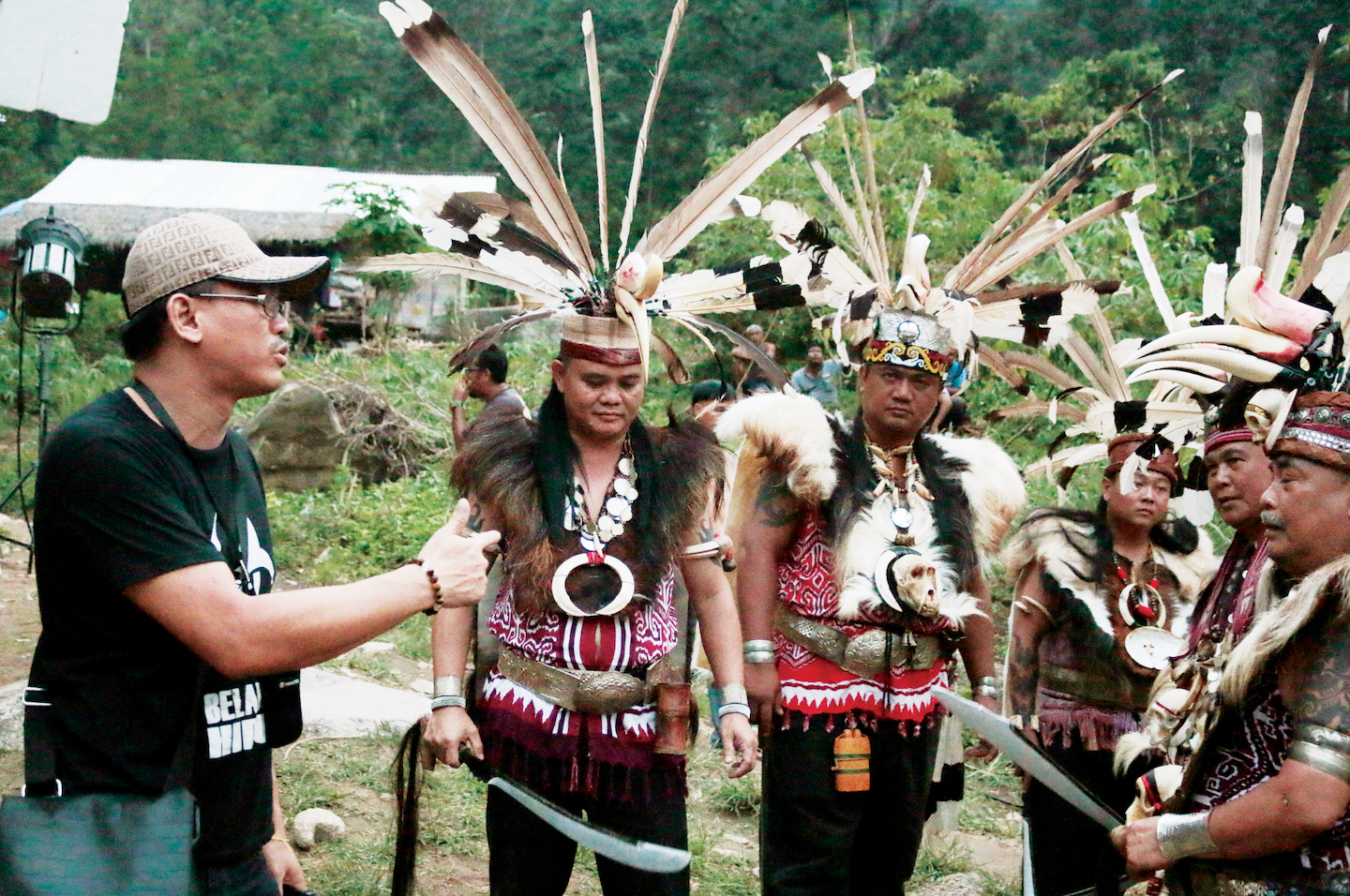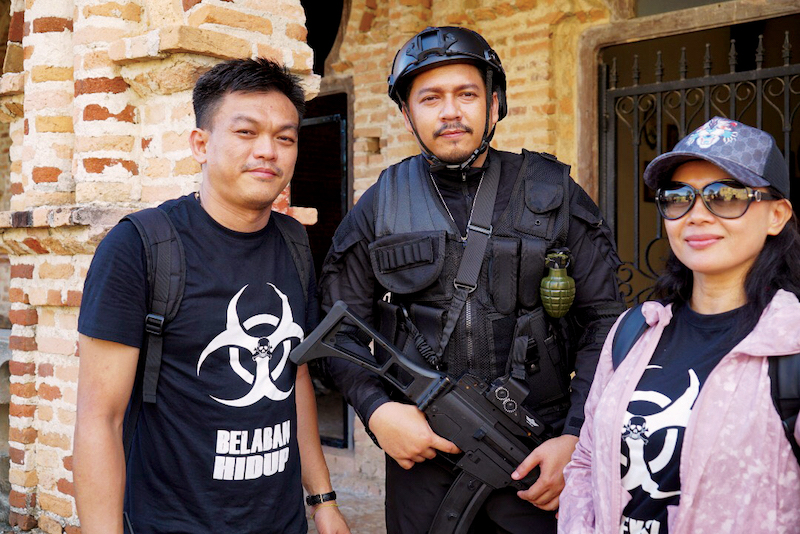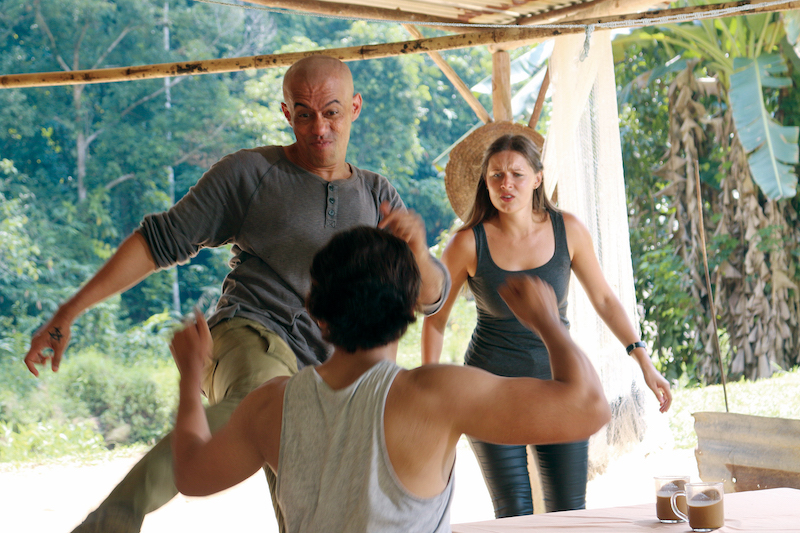
Lee with some of the cast portraying Dayak warriors who have to save their village from zombie attacks (All photos: Hornbill Films)
Seeing is believing. When it comes to the supernatural though, sounds can make you feel things that are more real than what sight affords.
“Sangat takut,” Misha Minut Panggau says of that night decades ago when she heard footsteps in her longhouse and a person crying. Someone had died in the next room the night before. “I felt weak and tried to wake my friend beside me but could not. It was only when the cock started crowing that the sounds disappeared.”
This and other haunting encounters convinced the Dayak filmmaker — who is making a stir in the horror-action scene with her debut movie, Belaban Hidup: Infeksi Zombie — that there are other beings among us.
“A lot of my own experiences have God and ghosts. I grew up in a longhouse in Limang, Sarawak, and my grandmother would tell us about hantu whenever people died. I believe lah. The Dayaks have lots of horror stories about the jungle. We can’t see them, but we can feel.”
The Belaban Hidup (meaning “fight for life” in Iban) team had their own eerie encounters when they started filming in 2019. Ray Lee, Misha’s husband and the director, said he saw three figures in white floating around. A crew member dreamt that three children were angry about their presence in the jungle. Subsequently, three chickens they had brought for the shoot went missing.
“No, we didn’t move out, but we prayed. Ray burnt some joss sticks and I performed an Iban ritual,” says Misha, who scripted, produced and co-directed the film about a group of orphans held captive by a mad scientist who wants to use them in virus experiments. When things go awry, the indigenous Dayak warriors have to save the village from attacks by zombies.
82df6923-6d53-4d20-b3f5-c49d390f857c.jpg

Pablo Amirul, Altimo, Pekin Ibrahim, Anna Melissa, Cassidy Panggau, Slovakian-born actress Katrina Grey and Indonesian singer Tegar are among the cast of Belaban Hidup, winner in the horror and science-fiction category at the World Film Carnival — Singapore in March. That same month, it was named best film and best horror film at the International Symbolic Art Film Festival in St Petersburg, Russia.
The Hornbill Films and Harry Aziz Entertainment production — funded by Finas (the National Film Development Corporation) — has won other awards and is lined up for screenings at various film festivals. It started streaming on Astro First on Aug 28 and will be shown via Japan Hulu from Sept 16.
Beneath the gore of its genre, the work captures the beauty of Misha’s home state and presents Iban culture and traditions, costumes, music, dance, way of life and language — with scenes of villagers speaking jaku Iban, says Misha, who is proud of her maiden script and being the first Dayak to create and produce a film about the indigenous peoples of Borneo.
She has a part too, as a mother who, stricken by a zombie virus, blinds herself so she will not be able to single out her son and cause him harm. Besides parental love, inspired by her late father, the movie is also about the faithfulness of friends and not giving up in the face of hardship.
“When doing the script, I thought, ‘What would happen to the world if a calamity were to hit us? How would humans react to that? How would we fight something beyond our control?’ The film is a reminder that we need to unite to face problems.”
The 90-minute feature, shot over three weeks in Sarawak and Perak, germinated from a short film she and Lee made in 2016 titled Belaban Idup. Initially, they wanted to portray ethnic groups at odds with each other, but worried that that could be sensitive. “So, we decided on zombies because of my interest in sci-fi make-up — there is nothing to stop my imagination. Besides, I could help with the props and Iban culture and costumes,” adds Misha, who started out in the industry 11 years ago as a make-up artist, before being cast as an extra.
Horror make-up is not just about slapping on red or white paint to suit. “I had to practise and make the burns and scars look real.” Each zombie — they show feelings too — had to look different, says Misha, who studied make-up, then learnt special effects make-up by watching YouTube and through trial and error.
In 2016, she was an associate producer in Bollywood Express, a programme aired by Astro Tara. She continued to do short films, among them Dendam Gadang, Dead Zone, Guitar Boy, Melody Aqil, Midnight Motel and the telemovie Bibikku Maduku. The desire to see her work on the big screen prompted her to turn Belaban Idup into a full-length feature.
img_0926.jpg

“As a filmmaker, I want to show the world how unique and beautiful our natural scenery is. I want to promote Malaysia, especially Sarawak, to the world. I want to use film to archive Iban language, customs and practices so they will not disappear in time. I also want to generate jobs for the Dayak and draw them into the industry.”
She hopes to write a script about a woman standing up against a group of illegal loggers trespassing on ancestral land inherited from her father and cast herself in the lead role. “I will shoot at beautiful locations and insert Iban ceremonial rituals through dance to show the ethnic lifestyles. There are more than 70 ethnic groups within the Dayak community, such as the Bidayuh, Kenyah and Kayan.”
Currently, she and Lee are doing pre-production work on Kaban, a telemovie about friends Engkang and Kunyo from ancient times who zoom into the modern world on a time machine. They came up with the story idea and she did the script. “It’s an action-comedy filmed in Kuching, using only the Iban language.
“I prefer to make classic movies, not a modern story, to show old-style society and how people used to live. Iban culture is considered a national treasure because it is exotic and unusual.”
Producers from Kalimantan, the US, Europe and Japan have offered to do collaborations with Hornbill, and they are weighing the options. “We want to work with international teams to gain universal appeal, but we will still include elements like local traditions and the longhouse in our movies,” says Misha.
There will be a Belaban Hidup sequel, to be shot in Kalimantan with an international production team. And there will be more films about nature, which Misha — who took master classes in directing from filmmakers Bobby Roth and Peter Marshall — loves, and horror.
“People love horror films. Me too, from young. It’s like a challenge to see how brave they are as they ask, ‘True ah, hantu exist?’
“Before, ghosts could fly and were visible. Horror movies now [play with] sounds, the weather, movement and the surroundings. You don’t have to show anything. The right music played beside a staircase can be scary,” says Misha, who is putting her personal experiences from long ago into such a film. “I’m writing the script now.”
This article first appeared on Sept 13, 2021 in The Edge Malaysia.


